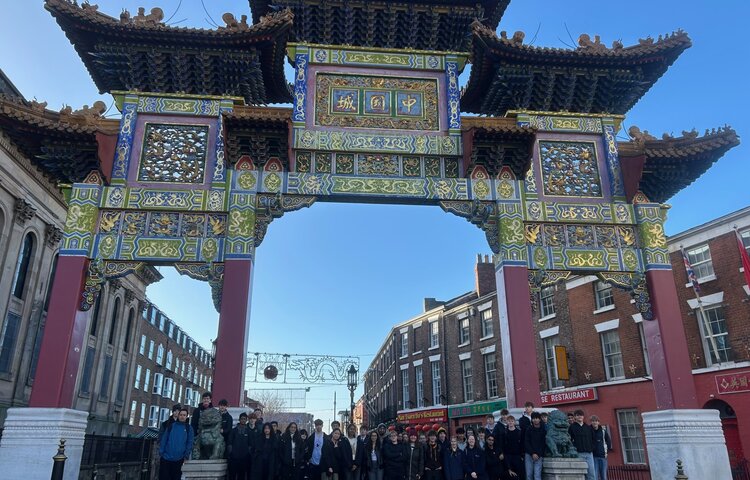Religious Education
Intent
At Penwortham Priory Academy we believe that Religious Education is a key element to the education of all pupils. We aim to give each pupil the opportunity to apply and develop their prior understanding and show initiative skills across a wide range of topics and tasks throughout the key stages. Pupils are encouraged to develop their confident in a safe environment, with the understanding and tolerance of all religious and worldviews whilst challenging and developing their own personal perspectives. With the knowledge that the Religious Education Curriculum will continue to form a major part in their life at home, in further education and places of work, we ensure the experiences and abilities that the pupils are equipped with at Priory; such as leadership, organisation and communication skills, are effective and resilient learners such as critical thinking and the use of eternal sources.
Through religious education, students build on prior learning from Key Stage 2 to broaden their understanding and appreciation of different world views. They are challenged to learn through the use of ‘BIG Questions’ and are required to think hard in lessons using ‘higher order’ skills such as analysis and evaluation. The curriculum encourages them to develop their leadership and organisational skills in the practical tasks and through opportunities to lead and organise food-based events with support. Students are expected to show resilience whilst articulate beliefs, values and commitments clearly in order to explain why they may be important in their own and other people’s lives.
Knowledge underpins our curriculum therefore learning about and from religions is given equal weighting. Pupils are given an overview of their learning journey at the start of their unit of work so that they know what they’ll be learning, the skills they’ll develop, why they need to know this and how they’ll learn it; this helps them develop their schemata and helps them understand how this subject links to others.
The curriculum is sequenced to build on existing knowledge and incrementally develop new knowledge. Pupils understand the sequence and what they’re required to learn as a result of using personal learning checklists. Spaced retrieval, low stakes testing, and repeated practice are used to ensure that concepts are understood, and knowledge remembered. We place emphasis on the acquisition of subject specific vocabulary, modelling and explaining this in our teaching and facilitating exposure to it using ‘real-life’ application of their learning.
In addition to the diverse and rich opportunities offered through the teaching, we value opportunities to take pupils out on trips and welcoming visitors to the school to enhance the Extra-curricular opportunities such as church groups are offered to pupils and staff.
The ultimate goal for students studying our curriculum is to develop them so that they can:
-
Think like Philosopher
-
Speak like Philosopher
-
Write like Philosopher
Teachers of Religious Education
Mrs K Ham - Lead Teacher of RE
Mrs A Holland - Teacher of RE
Lessons
Year 7 – 1 hour a week
Year 8 – 1 hour a week
Year 9 - 1 hour a week
Year 10 – GCSE x 3 hours a week / Core Faith Day
Year 11 - GCSE x 3 hours a week / Core Faith Day
Implementation
This will be carried out in the following way:
- Clear overview of curriculum from Years 7 to 11 showing development of knowledge about and from religions as well as examining Worldwide Views. strands based on threshold concepts. Students will receive one hours per week in Years 7 to 9, with three hours per week at GCSE.
- Clear overview of curriculum within each key stage and each year, showing the sequence of learning.
- Shared and consistent lesson structures with accompanying resources.
- Coherent step-by-step sequences that build on existing knowledge and allow incremental development of knowledge about and from differing viewpoints.
- Access to broad and deep factual knowledge that allows them to use a range of thinking skills, including those that are deemed to be ‘higher order’ skills such as analysis and evaluation.
- Focus on learning – changes to long term memory – not performance. This will be implemented through the use of low stakes testing and interleaving.
- Explicitly teaching new tier two and tier three vocabulary
- Unrelenting focus on key concepts.
- Embedded regular retrieval practice and spaced practice
- Embedded and consistently applied homework focused on knowledge retrieval.
- 'Close the gap’ by building and retaining long term knowledge in PP students.
RE Curriculum
Attainment and Progress (national tests and assessments)
2023 GCSE Religious Education Outcomes
|
Subject |
9 - 7 % |
9 - 5 % |
9 - 4 % |
|
Religious Education |
7.7 |
38.5 | 46.2 |
Extra Curricular Clubs
The RE department hold a debate club who meet weekly and will take part in debate with other schools within the area.
House Competitions (run annually)
A Spirited Art competition runs each year for KS3 around a taught theme.
Trips and visits
- Trips to local colleges to experience Religious Education at A Level
- Visiting local Places of Worship such as Gujarat Hindu Society Temple Visit Booking
- Cultural Experiences
- Cross curricular links are made to support cultural experiences such as Bruges trip including the Commonwealth Graveyard at Tyne Cot.
Where can studying RE take you?
Related News
Sacred Places to Shopping Spaces; Year 11 Take Liverpool by Storm
Our cross-curricular Religious Education and Geography visit to Liverpool.
Year 9 Reach New Heights As They Explore Iconic Landmark
Year 9 pupils this week had an opportunity to visit the magnificent St Walburge's Church


.jpg)